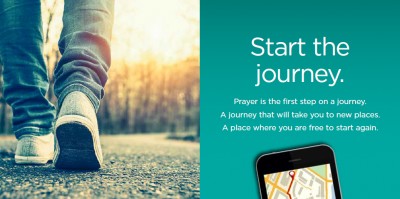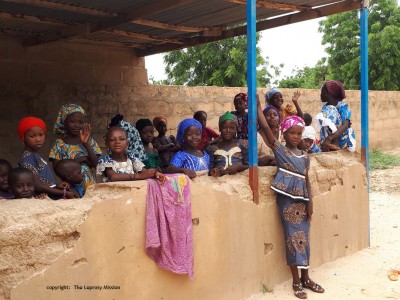Trypraying booklet for prisoners
09 Nov 2017This came from a request by chaplains who wanted a prisoner-friendly version of the original trypraying booklet. Written in collaboration with prisoners, it is based around the idea of ‘how to pray’ and uses prisoner testimonies, Bible stories, bold imagery and simple wording to introduce the Christian faith and the good news of Jesus. As well as being an engaging read for prisoners, it’s a useful tool for volunteers and workers, that opens up conversation in a natural way.

This version is geared towards male prisoners with a women’s version currently in production.
Churches are being invited to sponsor a minimum of 20 copies for their local or regional prison. The booklet is £1.00 per copy and can be ordered online at: www.thereishope.co.uk/resources/ or email This email address is being protected from spambots. You need JavaScript enabled to view it. or call the office on 0131 202 6449
Pray for The Leprosy Mission
08 Nov 2017The Leprosy Mission, (TLM) an international Christian development organisation, diagnoses, treats and offers specialist care, including reconstructive surgery, to people affected by leprosy. Its aim is to help transform and empower the lives of people affected by leprosy.
Leprosy is a disease of poverty and as well as providing healthcare, TLM offers rehabilitation, education, vocational training, small business loans, housing and fresh water supplies and sanitation to tens of thousands of people each year. TLM provides a springboard to restored health, self-sufficiency and renewed hope. Its services are provided regardless of religion or ethnicity, promoting equality and social justice.
Danja village in Niger has around 7,500 inhabitants, with around 60 per cent affected by leprosy. It sprang up as a settlement close to Danja Hospital, where people who came for treatment settled because they did not want to go back to their home villages due to stigma and the distance from the hospital.
Nine leprosy-affected communities in the southern region of Maradi are encouraged to access leprosy treatment through awareness raising activities about leprosy symptoms and treatment. People affected by leprosy also receive surgery, mobility aids and help with disability prevention. Government health staff from across the region are trained to detect and treat leprosy. A range of socio-economic development activities near the hospital are also supported. Housing and water supplies are provided, and children are given support to attend school. Literacy classes are organised, especially for women, and young people are helped to access vocational training.
Danja Secondary School gets destroyed by the rains each year and must be rebuilt. Some children prefer to walk the 15km into Maradi each day to go to the secondary school, where there are about 400 students. The school is getting better at retaining girl students but early marriage and dropping out of school is still an issue. However, the local primary school has 800 children so there is a high drop-out rate.
Please pray for TLM’s work in Niger:
- Pray for people affected by leprosy in Niger who are often ostracised from their families (and even their children) once diagnosed with leprosy. Any outward signs of leprosy can cause fear and a spouse to reject husband/wife, forcing them to leave children, and devastating lives. Give thanks that TLM is helping people affected by leprosy to piece their shattered lives back together through surgery, training and education and pray that more will come forward for help.
- Give thanks for the opportunities that The Leprosy Mission can give to people affected by leprosy. Opportunities for medical care, school education and training for employment. Give thanks that these opportunities are life-changing, like the adult literacy classes which enable people to read and write, giving them better chances of employment so they can help support their families. Pray that more people will be encouraged to come forward early for diagnosis and treatment, knowing that they can also benefit from the same care, education and training.
- Pray that more reliable, clean water supplies will be provided to Danja hospital and nearby communities in Niger, so that hope is restored and risk to health is reduced because people do not need to walk such long distances to unclean wells.
- Pray for Danja Leprosy Referral Hospital in Niger, which faces financial, staffing and resources challenges. Ask God to meet these needs to ensure the smooth running of the centre and the best possible service for people affected by leprosy.
- Pray for Issa, a former leprosy patient, who is now the chairperson of the International Association for Integration, Dignity and Economic Advancement (IDEA). Give thanks for the encouragement he gives to other members of IDEA, through his own testimony, as they share their experiences, touching other people and bringing about a better understanding of leprosy.
Thank you so much for praying for people affected by leprosy and TLM's work with the many people who are still marginalised, disabled and shunned just because they have leprosy.
Your prayers really do make a difference.
Source: The Leprosy Mission
80-year-old meets Jesus
03 Nov 2017Jason and Nisae Williamson are planting a church among the Iski people group in Papua New Guinea. Anka, an elderly man, was sent to their village so that he could hear the good news, as the believers in his family were concerned about his age and declining health. Anka is at least 80 with a palpable fear of death. Local religious leaders said he had to earn his way to heaven, and he needed to worship and appease the spirits. The Williamsons prayed that Anka would receive Jesus before he died. After four months of morning Bible study, Anka was overflowing with joy: ‘Now I know that Jesus paid for my sins and I’m a child of God. I do not fear death any more, I will die and be with God!’ He had been born again and was filled with the Spirit.
Paul, a convert from Islam, now works distributing food to newly-arriving Syrian refugee families. Recently, he gave out the last food package he had for the entire month. The lady next in line started crying when she realised there was none left for her family. She told Paul that she and her children were desperate. Paul said they were out of food packages, but offered to pray for her. He also told her how he came to Jesus. As they finished praying, Paul’s phone rang with the unexpected news that another 35 food portions were available. The mother, full of wonder and gratefulness, praised God for how Jesus had answered their prayer. A few weeks later, her husband (who had been fighting with IS) came to meet Paul. He said, ‘I heard what you had done for my family. I thought about how I was in Syria killing people in the name of religion, but you love in the name of Jesus. I left the other fighters to come and meet the man who loved my family, and to learn about Jesus from you.’
Friday Focus: joyful invitation
03 Nov 2017When Jesus sends out the 72 he tells them the truth that as they go to invite people to hear about the kingdom of God, they will be either welcomed or rejected: if the latter, they are to wipe the dust from their feet. Do we miss the joy of inviting people to take a closer look at Jesus because we fear rejection?
(Michael Harvey, National Weekend of Invitation)
Sex scandals in parliament and Oxfam
03 Nov 2017Following the sex scandal surrounding Hollywood mogul Harvey Weinstein, several senior government ministers have now been accused of inappropriate sexual behaviour in a dossier circulating Westminster. Then on 2 November the media reported that defence secretary Sir Michael Fallon had resigned over accusations of inappropriate behaviour. A spokesman for the Prime Minister said that any unwanted sexual behaviour is ‘completely unacceptable in any walk of life’. Meanwhile, it was revealed that Oxfam had dismissed 22 employees over sexual abuse allegations in the past year. Concern is rising about Oxfam’s management of overseas networks. Pray that all that is hidden in commerce, industry and the armed forces is revealed, and that all women are dealt with as professionals and as equals. See:
Luther-style protest over gay relationships
03 Nov 2017A campaign targeting cathedrals around the UK is spreading off the back of the 31 October 500th anniversary of the Protestant Reformation when an Augustinian monk criticised some practices of the church. The Ninety-five Theses (propositions) were pinned to a noticeboard and later posted on the door of a German cathedral. A list of 'declarations', reminiscent of the reformation protest, is being pinned to cathedral doors by priests objecting to what they see as the CofE's liberal approach to same-sex relationships. St Paul's Cathedral and Southwark Cathedral were the first to have the ‘Southwark Declaration’ promoting conservative Anglican theology attached to their doors. Next, Hereford and Rochester Cathedrals were targeted in what is becoming a nationwide campaign. The campaigners are focusing on cathedrals which they perceive to have a liberal slant. The document, signed by over sixty priests, hopes to pressure bishops into maintaining a conservative approach to same-sex relationships.
Northern Ireland budget bill
03 Nov 2017Plans are being put in place to impose a budget for regional government departments in Northern Ireland, the secretary of state has revealed. But James Brokenshire stressed this did not mean a return to direct rule from London over the province. The Northern Ireland secretary vowed on 1 November that he would shelve his budget preparations if the two main parties in the Stormont assembly, (Sinn Féin and the Democratic Unionists) quickly secured a deal to restore power-sharing to Belfast. However, Sinn Féin said that imposing a budget from Westminster was tantamount to direct rule and would derail the negotiations between the two parties. In return, Brokenshire emphasised that if he failed to act in the next few weeks, the regional government ministries in Belfast would simply run out of money. So he is planning to enable a budget bill to be introduced at Westminster when appropriate, to protect the delivery of Northern Ireland’s public services.







